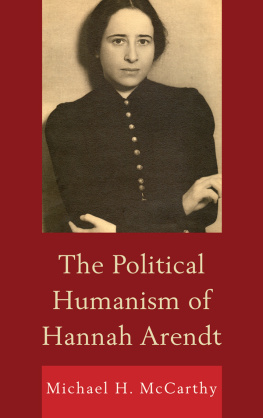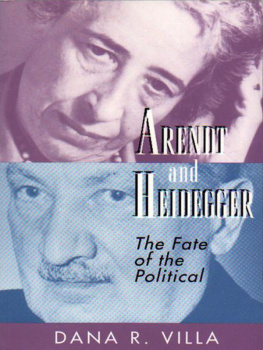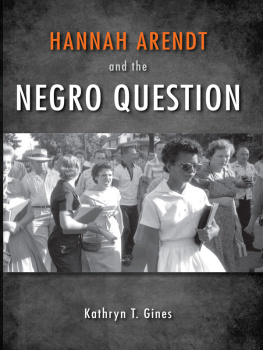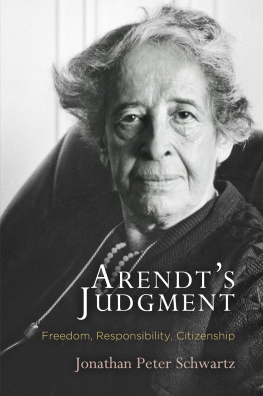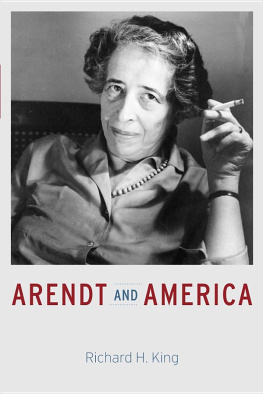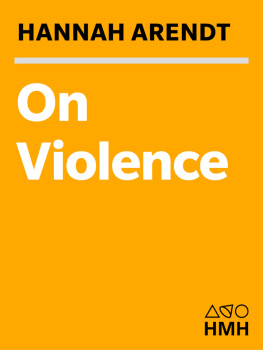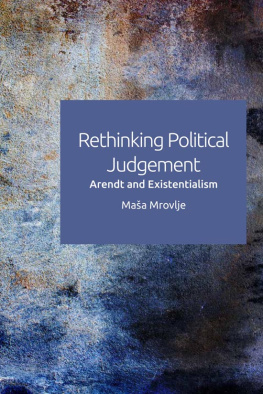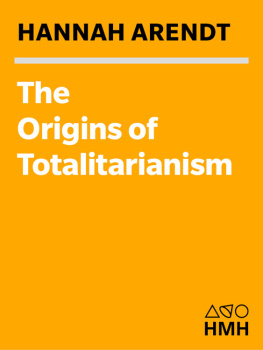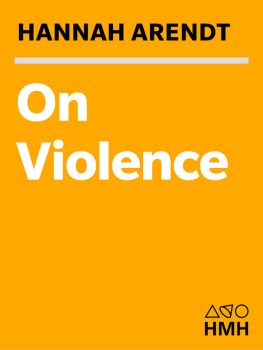Arendt Hannah - The Political Humanism of Hannah Arendt
Here you can read online Arendt Hannah - The Political Humanism of Hannah Arendt full text of the book (entire story) in english for free. Download pdf and epub, get meaning, cover and reviews about this ebook. City: Lanham;Md, year: 2014;2012, publisher: Lexington Books, genre: Politics. Description of the work, (preface) as well as reviews are available. Best literature library LitArk.com created for fans of good reading and offers a wide selection of genres:
Romance novel
Science fiction
Adventure
Detective
Science
History
Home and family
Prose
Art
Politics
Computer
Non-fiction
Religion
Business
Children
Humor
Choose a favorite category and find really read worthwhile books. Enjoy immersion in the world of imagination, feel the emotions of the characters or learn something new for yourself, make an fascinating discovery.
- Book:The Political Humanism of Hannah Arendt
- Author:
- Publisher:Lexington Books
- Genre:
- Year:2014;2012
- City:Lanham;Md
- Rating:4 / 5
- Favourites:Add to favourites
- Your mark:
- 80
- 1
- 2
- 3
- 4
- 5
The Political Humanism of Hannah Arendt: summary, description and annotation
We offer to read an annotation, description, summary or preface (depends on what the author of the book "The Political Humanism of Hannah Arendt" wrote himself). If you haven't found the necessary information about the book — write in the comments, we will try to find it.
The Political Humanism of Hannah Arendt — read online for free the complete book (whole text) full work
Below is the text of the book, divided by pages. System saving the place of the last page read, allows you to conveniently read the book "The Political Humanism of Hannah Arendt" online for free, without having to search again every time where you left off. Put a bookmark, and you can go to the page where you finished reading at any time.
Font size:
Interval:
Bookmark:
The Political Humanism
of Hannah Arendt
The Political Humanism
of Hannah Arendt
Michael H. McCarthy
LEXINGTON BOOKS
Lanham Boulder New York Toronto Plymouth, UK
Published by Lexington Books
A wholly owned subsidiary of The Rowman & Littlefield Publishing Group, Inc.
4501 Forbes Boulevard, Suite 200, Lanham, Maryland 20706
www.rowman.com
10 Thornbury Road, Plymouth PL6 7PP, United Kingdom
Copyright 2012 by Lexington Books
All rights reserved. No part of this book may be reproduced in any form or by any electronic or mechanical means, including information storage and retrieval systems, without written permission from the publisher, except by a reviewer who may quote passages in a review.
British Library Cataloguing in Publication Information Available
Library of Congress Cataloging-in-Publication Data
McCarthy, Michael H., 1942
The political humanism of Hannah Arendt / Michael McCarthy.
p. cm.
Includes bibliographical references and index.
ISBN 978-0-7391-7719-8 (cloth : alk. paper) -- ISBN 978-0-7391-7720-4 (electronic)
Political and social views. 2. Humanism. I. Title.
JC251.A74M394 2012
320.5--dc23
2012021598
 The paper used in this publication meets the minimum requirements of American National Standard for Information Sciences Permanence of Paper for Printed Library Materials, ANSI/NISO Z39.48-1992.
The paper used in this publication meets the minimum requirements of American National Standard for Information Sciences Permanence of Paper for Printed Library Materials, ANSI/NISO Z39.48-1992.
Printed in the United States of America
Hannah Arendt was one of the most important political thinkers of the twentieth century. A European by birth, culture and education, she reached maturity during what Eric Hobsbawm has called the age of catastrophe. Between 1914 and 1945 the stabilizing structures of modern Europe collapsed. While the parliamentary democracies of England and France remained impotent, fascist regimes consolidated their power in Italy and Spain, and popularly supported totalitarian governments emerged in Hitlers Germany and Stalins Soviet Union. Totalitarianism was an unprecedented form of human domination, based on ideology and terror, which slaughtered millions of innocent people in the name of utopian ideals. Although Nazi Germany was defeated eventually, the two world wars had transformed Europe from the center of world civilization to a demoralized continent in ruins. From Arendts critical perspective, the political and economic collapse of Europe extended to its intellectual, moral and cultural traditions as well. The vital human connection between the past and present had been severed; conscientious citizens were now forced to think without banisters (denken ohne Gelnder).
At the end of the Second World War when the horror of the Holocaust became known, Hannah Arendt committed herself to a work of remembrance and reflection. Intellectual integrity demanded that we comprehend and articulate the genesis of totalitarian terror. What earlier spiritual and moral collapse had made totalitarianism possible? What was the basis of its evident mass appeal? To what cultural resources and political institutions could we turn to prevent its recurrence? After long years of study, Arendt concluded that the deepest crisis of the modern world was political, and that the continuing appeal of totalitarian mass movements demonstrated how profound that crisis had become.
The crisis she identified could be discerned on four distinct but interconnected levels: cultural, theoretical, institutional, and normative. The world-alienation of modernity had promoted a mass culture antithetical to republican self-government and especially prone to ideological manipulation. Our theoretical capacity to critique this culture and the ideologies it spawns is compromised because our inherited traditions have systematically misrepresented the nature of political experience. By substituting making (poiesis) for action (praxis), command and coercion for persuasion and agreement, and technical mastery for political excellence and judgment our traditional theorists have darkened the common perception of politics and reduced it to a servant of economic needs and concerns. The striking rise of economics to its present cultural supremacy has transformed the public realm into a sphere of necessity rather than freedom, while the enduring attractions of freedom have been confined to the individual pursuit of private happiness. As a result, the demoralized individuals who live within mass societies lack the informed commitment to public liberty that is needed to sustain the republican spirit. And without that spirit, the lost spirit of the great democratic revolutions, modern citizens no longer know what to require of themselves and their political leaders, now how to judge responsibly their public conduct and speech.
For Arendt, the modern political crisis is also a crisis of humanism. The radical totalitarian experiment was rooted in two fundamentally distorted images of the human being. The agents of terror believed in the limitless power generated by collective organization, a power wielded and justified by appeal to historical necessity. The victims of terror, by contrast, were systematically dehumanized by the ruling ideology, and then brutally deprived of their legal rights and their moral and existential dignity. Hannah Arendts political humanism explicitly challenges both of these distorting images, the first because it dangerously inflates human power, the second because it subverts human freedom and agency. Human beings living together on the earth, in a humanly constructed world and within a web of fragile human connections are neither sovereign masters nor superfluous animals. Rather, they are singular and unique persons capable of distinguishing themselves through action and speech, and requiring both a public realm of freedom and excellence and a private realm of security and intimacy to protect and enhance their dignity.
In the tradition of civic republican thinkers that stretches from Aristotle to Charles Taylor and Michael Sandel, Arendt made the concepts of political liberty, civic virtue and public happiness essential to her understanding of genuine citizenship. Equipped with these normative principles, she directly challenged the reductive modern anthropologies that had reduced human beings to calculating economic animals. The ideological reduction of the human person had not only been used to justify totalitarian terror; it had also contributed to the political alienation of democratic citizens in contemporary liberal societies. If we are to recover a more authentic understanding of the human being, we will need a much richer and deeper conception of citizenship than conservatism, liberalism or Marxism provides.
Hannah Arendts political humanism develops over several decades. It begins with her examination and appraisal of The Origins of Totalitarianism (chapter 1). It expands with her critical retrieval of the vita activa in The Human Condition (chapter 2). These two early works provide the intellectual horizon for her genealogical critique of our tradition of political thought. In developing that critique, she amplifies her civic republican vision of citizenship by contrasting it with the dominant political visions that have shaped the western tradition (BetweenPast and Future, On Revolution, Eichmann in Jerusalem, Lectures on Kants Political Philosophy).
Chapters 3 and 4 present Arendts critique of the tradition in its most salient and formative aspects. Many commentators on Arendt cite the importance of her genealogical criticism; very few seek to develop, understand and appraise it. I found that in providing this evaluative contrast, the merits and limitations of her thought became considerably clearer and more focused.
Next pageFont size:
Interval:
Bookmark:
Similar books «The Political Humanism of Hannah Arendt»
Look at similar books to The Political Humanism of Hannah Arendt. We have selected literature similar in name and meaning in the hope of providing readers with more options to find new, interesting, not yet read works.
Discussion, reviews of the book The Political Humanism of Hannah Arendt and just readers' own opinions. Leave your comments, write what you think about the work, its meaning or the main characters. Specify what exactly you liked and what you didn't like, and why you think so.

